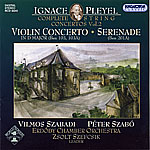Ignaz Pleyel was one of Franz Joseph Haydn’s most accomplished and beloved students. After accepting Pleyel when he was only 15 years old, Haydn’s lifelong admiration increased steadily as he witnessed his protégé become not only a celebrated composer but also an esteemed piano maker and successful music publisher (Pleyel published the first complete edition of Haydn’s string quartets). Listening to Vilmos Szabadi’s spirited premiere recording of Pleyel’s first violin concerto clearly confirms the legitimacy of Haydn’s respect for his pupil–it’s an expertly crafted work on par with the finest examples of string concertos of the late Classical period.
From the onset, the rich thematic variety and rhythmic diversity of the first-movement Allegro spirituoso is stunning, affording both soloist and orchestra numerous expressive opportunities (how often can that be said!). Szabadi heightens the movement’s complexity with virtuosic florid displays, offering a lavish, Paganini-esque series of cadenzas in the finale. A soulful, probing Largo follows, after which Szabadi offers two finales–first, the subsequently published Rondo Allegro version, and then the twice-as-lengthy Allegro that Pleyel originally penned. The revised, more concise version works best–it’s an infectious gallop (complete with hunting horns) frequently laced with Szabadi’s witty solos humorously curtailing the chase.
While equally well crafted and reasonably charming, Pleyel’s Serenade is less inspired, sounding like so many other chamber works of this period that were composed primarily for wealthy amateurs who simply needed something to play. Hungaroton’s sound is fine, with the soloists slightly more pronounced in the mix. Eniko Gyenge’s brief notes adequately summarize the composer’s life and authoritatively describe the works at hand.
































